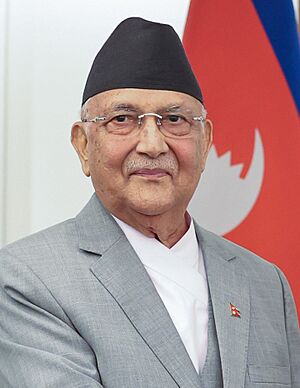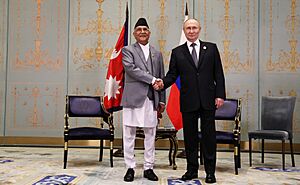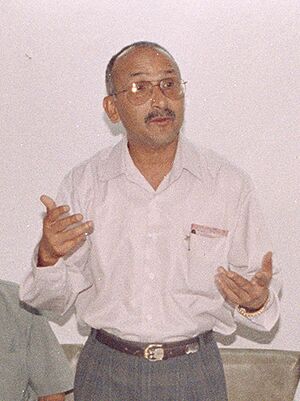K. P. Sharma Oli facts for kids
Quick facts for kids
K. P. Sharma Oli
|
|||||||||||||||||||||||||||||||||||||||||
|---|---|---|---|---|---|---|---|---|---|---|---|---|---|---|---|---|---|---|---|---|---|---|---|---|---|---|---|---|---|---|---|---|---|---|---|---|---|---|---|---|---|
| के.पी. शर्मा ओली | |||||||||||||||||||||||||||||||||||||||||

Oli in 2025
|
|||||||||||||||||||||||||||||||||||||||||
| 38th Prime Minister of Nepal | |||||||||||||||||||||||||||||||||||||||||
| In office 15 July 2024 – 12 September 2025 |
|||||||||||||||||||||||||||||||||||||||||
| President | Ram Chandra Poudel | ||||||||||||||||||||||||||||||||||||||||
| Deputy | Bishnu Prasad Paudel Prakash Man Singh |
||||||||||||||||||||||||||||||||||||||||
| Preceded by | Pushpa Kamal Dahal | ||||||||||||||||||||||||||||||||||||||||
| Succeeded by | Sushila Karki (interim) | ||||||||||||||||||||||||||||||||||||||||
| In office 15 February 2018 – 13 July 2021 |
|||||||||||||||||||||||||||||||||||||||||
| President | Bidya Devi Bhandari | ||||||||||||||||||||||||||||||||||||||||
| Preceded by | Sher Bahadur Deuba | ||||||||||||||||||||||||||||||||||||||||
| Succeeded by | Sher Bahadur Deuba | ||||||||||||||||||||||||||||||||||||||||
| In office 12 October 2015 – 24 August 2016 |
|||||||||||||||||||||||||||||||||||||||||
| President | Ram Baran Yadav Bidya Devi Bhandari |
||||||||||||||||||||||||||||||||||||||||
| Preceded by | Sushil Koirala | ||||||||||||||||||||||||||||||||||||||||
| Succeeded by | Pushpa Kamal Dahal | ||||||||||||||||||||||||||||||||||||||||
| Leader of the Opposition | |||||||||||||||||||||||||||||||||||||||||
| In office 27 February 2023 – 4 March 2024 |
|||||||||||||||||||||||||||||||||||||||||
| Prime Minister | Pushpa Kamal Dahal | ||||||||||||||||||||||||||||||||||||||||
| Preceded by | Sher Bahadur Deuba | ||||||||||||||||||||||||||||||||||||||||
| Succeeded by | Sher Bahadur Deuba | ||||||||||||||||||||||||||||||||||||||||
| In office 13 July 2021 – 26 December 2022 |
|||||||||||||||||||||||||||||||||||||||||
| Prime Minister | Sher Bahadur Deuba | ||||||||||||||||||||||||||||||||||||||||
| Preceded by | Sher Bahadur Deuba | ||||||||||||||||||||||||||||||||||||||||
| Succeeded by | Sher Bahadur Deuba | ||||||||||||||||||||||||||||||||||||||||
| In office 4 August 2016 – 15 February 2018 |
|||||||||||||||||||||||||||||||||||||||||
| Prime Minister | Pushpa Kamal Dahal Sher Bahadur Deuba |
||||||||||||||||||||||||||||||||||||||||
| Preceded by | Sushil Koirala | ||||||||||||||||||||||||||||||||||||||||
| Succeeded by | Sher Bahadur Deuba | ||||||||||||||||||||||||||||||||||||||||
|
|||||||||||||||||||||||||||||||||||||||||
|
|||||||||||||||||||||||||||||||||||||||||
|
|||||||||||||||||||||||||||||||||||||||||
| Personal details | |||||||||||||||||||||||||||||||||||||||||
| Born |
Khadga Prasad Sharma Oli
22 February 1952 Iwa, Kingdom of Nepal |
||||||||||||||||||||||||||||||||||||||||
| Political party | CPN (UML) (1991–2018; 2021–present) | ||||||||||||||||||||||||||||||||||||||||
| Other political affiliations |
|
||||||||||||||||||||||||||||||||||||||||
| Spouse |
Radhika Shakya
(m. 1987) |
||||||||||||||||||||||||||||||||||||||||
| Parents |
|
||||||||||||||||||||||||||||||||||||||||
| Signature |  |
||||||||||||||||||||||||||||||||||||||||
Khadga Prasad Sharma Oli, known as K. P. Sharma Oli or K. P. Oli, is a well-known politician from Nepal. He was born on 22 February 1952. He served as the Prime Minister of Nepal three times: from 2015 to 2016, 2018 to 2021, and most recently from 2024 to 2025.
K. P. Oli is also the chairman of the Communist Party of Nepal (Unified Marxist–Leninist) since 2014. He has been a Member of Parliament for Jhapa 5 since 2017.
During his time as Prime Minister, Oli worked to improve Nepal's connections with other countries. He focused on building stronger ties with China. He also faced challenges, like the 2015 blockade of Nepal. He resigned as prime minister on 9 September 2025, following public protests.
Contents
Growing Up in Nepal
K. P. Sharma Oli was born on 22 February 1952 in a place called Iwa in Tehrathum. His father, Mohan Prasad Oli, was a farmer. Sadly, his mother, Madhumaya Oli, passed away when he was only four years old.
His family later moved to Jhapa. Oli went to Pranami Middle School for his early education. He finished his School Leaving Certificate (SLC) exam in 1970. During his youth, he became interested in politics and the idea of communism, influenced by his uncle, Ramnath Dahal.
Early Steps in Politics
K. P. Oli started his political journey when he was 18 years old in 1970. He joined a local communist group. Because of his political activities, he was arrested that same year.
He was imprisoned for many years, from 1973 until 1987. During his time in jail, he continued to be involved in politics. After his release, he became an active member of the CPN (Marxist–Leninist). He worked to bring different political groups together.
Becoming a Member of Parliament
In 1991, different communist groups joined to form the CPN (Unified Marxist–Leninist). K. P. Oli was one of its founding members. He was first elected as a Member of Parliament (MP) from Jhapa 6 in the 1991 election.
He was re-elected in 1994 and became the Home Minister in the government led by Man Mohan Adhikari. This was an important role, as the Home Minister is in charge of internal security.
Oli was elected as an MP again in 1999. After a big political change in Nepal in 2006, he became the Deputy Prime Minister of Nepal and Foreign Minister. This showed his growing importance in national politics.
Serving as Prime Minister
K. P. Oli was elected as Prime Minister of Nepal for the first time on 11 October 2015. He led a coalition government.
First Term as Prime Minister (2015–2016)
His first term as Prime Minister began during a challenging time for Nepal. There was a blockade that affected the country. During this period, Oli worked to strengthen Nepal's relationships with other nations, especially China. He signed important trade agreements with China. He resigned from this role in July 2016.
Second and Third Terms as Prime Minister (2018–2021)
In the 2017 general election, K. P. Oli's party and its allies won many seats. He was elected as an MP from Jhapa 5. He became Prime Minister for a second time on 15 February 2018.
Later, his party merged with another to form the Nepal Communist Party. He became a co-chairman of this new party. During this time, his government faced the COVID-19 pandemic. They worked to manage the health crisis and provide medical supplies.
In May 2020, Oli's government released new maps of Nepal. These maps included some disputed areas. This led to discussions with neighboring countries. Due to political disagreements, he resigned from his position in July 2021.
Fourth Term as Prime Minister (2024–2025)
After the 2022 general election, Oli's party became the second-largest. He was re-elected as an MP from Jhapa 5. In July 2024, he became Prime Minister for a fourth time. He formed a government with the Nepali Congress party.

However, he resigned as prime minister on 9 September 2025. This decision followed public protests in Nepal.
Political Ideas
K. P. Oli's political ideas were shaped by his uncle, Ramnath Dahal. He believed in communist principles from a young age. He was often in discussions with those who favored different political methods.
International Relations
Oli has always played a role in Nepal's relationships with other countries. He helped get parliamentary support for the Mahakali treaty with India.
During his first term as Prime Minister, he worked to strengthen Nepal's connections with China. This was especially important during the 2015 blockade. Later, his government updated Nepal's official map to include certain territories. This led to discussions with India.
Views on Government Structure
Oli has been seen as favoring a strong central government. During his time as Prime Minister, he worked to centralize executive power. He also had views on how provincial and local governments should operate.
Personal Life
K. P. Oli is married to Radhika Shakya. They met in 1987 at a political event. She was working and studying at the time. They got married later that year.
He lives in Balkot, Bhaktapur and also has a home in Damak, Jhapa.
Health Challenges
During his time in prison, Oli faced some health issues. Later in life, he developed kidney problems. He underwent a kidney transplant in 2007 and had a second transplant in 2020. He has received medical care for his health challenges.
Images for kids
-
Oli and Indian Prime Minister Narendra Modi in Janakpur, Nepal, 11 May 2018
-
Oli and Indian Prime Minister Narendra Modi in New Delhi, India, 20 February 2016
See also
 In Spanish: Khadga Prasad Oli para niños
In Spanish: Khadga Prasad Oli para niños
 | Jewel Prestage |
 | Ella Baker |
 | Fannie Lou Hamer |






